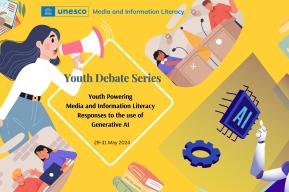News
UNESCO empowers unsung school heroes in Myanmar

Mobile teachers are the Myanmar school system’s unsung heroes. They trek mountain and cross rivers to reach learners in remote ethnic villages. To complicate matters, some villages are currently in conflict areas.
Teachers in these communities need competencies which will enable them to effectively carry out their work in challenging situations. At the same time, young learners need assurance that they are attending safe learning spaces.
Conflict-Sensitive Education (CSE) has recently evolved to empower educators to understand the historical, current and evolving conflict scenario, and to enable them to craft education policies, programmes and teaching practices which are conflict-sensitive. CSE enables both teachers and their learners to adopt safe and culturally-sensitive learning practices.
The UNESCO Antenna Office in Yangon (UNESCO Yangon) recently developed and offered a pioneering CSE-focused ‘Online Course for Mobile Teacher Trainers (MTTs) on Media and Information Literacy (MIL)’. Mobile teachers support skills upgrading of in-service teachers working in local ethnic communities. In addition, mobile teachers often liaise with local school management committees and with village elders and parents for their active engagement in education, health and other social activities. Indeed, UNESCO Yangon’s experience in the region suggests unequivocally that MIL competencies can enhance teaching skills and, in turn, transform students into fully engaged learners.
The CSE-focused MIL course was held in three half-day, online sessions in August 2023. It was attended by 32 mobile teacher trainers, 75 per cent of them women. UNESCO Yangon partnered with Rural Indigenous Sustainable Education (RISE), a network of indigenous education advocates. The course was conducted under the auspices of UNESCO’s regional project, ‘Strengthening Pre-Service Teacher Education in Myanmar’ (STEM).
According to Mr Ichiro Miyazawa, Head of the UNESCO Antenna Office in Yangon, the teacher trainer’s course can be a good model for other countries in how MIL education can be contextualized in various conflict situations. CSE expert Dr Mona Younes reminded the inaugural round of participants that ‘education [itself] might lead to conflict due to unequal education opportunities, grievances over identity, and curricula that promote militarism and praise war.’
Course sessions discussed MIL competencies for teachers and learners which can transform schools and other learning spaces into safe, conflict-sensitive spaces. Among topics discussed were MIL as a Composite Concept and Why MIL Education?; Conflict Sensitive Education; Hate Speech, Bias, and Discrimination Inside Learning Settings; Identifying Representations in Media, Information, and Digital Contents; Basic Skills in Discerning Disinformation/Misinformation; Intercultural Sensitivity in Classroom Teaching and Learning (including Developing Teaching-Learning Materials); and Online (Cyber) Safety Practices and Tools for Teachers and Learners.
In an online post-training evaluation of the course, about two-thirds of the participants noted that the course had high impact on their plans to continue their professional development. About 85 per cent of respondents said the course increased their level of understanding of CSE and what it entails for its successful application in the workplace. Meanwhile, 7 out of 10 responded that the course has also increased their understanding of MIL and its application as well.
When queried about their post-training plans, a majority replied that they planned to apply the lessons learned in their work settings, as well as share them with their teacher colleagues. Among the many encouraging responses shared with UNESCO, were ‘I believe I would be able to share [the training] with teachers in my community and solve some real-life problems under [our] current circumstances’; and ‘I will apply precautions and safety measures when I go to the field…and will encourage others to learn more about MIL and CSE using the UNESCO eLearning Platform.’
According to UNESCO Yangon Education Project Officer Kay Thi Oo, training resources are now being packaged into eLearning materials, inclusive of audiovisual support, for uploading in UNESCO Yangon’s eLearning Platform. This initiative will surely help transform teachers into peacemakers.
#EmpowerPeacemakers #UNPeacebuildingFundProject #TeacherEducationMyanmar #UNESCOYangon #MultiDonorProject
More from UNESCO Bangkok and UNESCO Yangon
Share
About the authors

Ramon Guillermo R. Tuazon is Consultant for Communication and Information at UNESCO Antenna Office in Yangon. He is the secretary general of the Asian Media Information and Communication Centre (AMIC) and a former president and current trustee of the Asian Institute of Journalism & Communication (AIJC).









